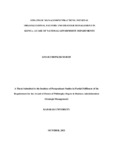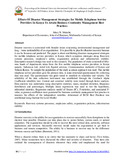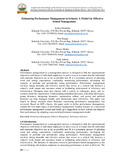STRATEGIC MANAGEMENT PRACTICES, INTERNAL ORGANIZATIONAL FACTORS AND DISASTER MANAGEMENT IN KENYA: A CASE OF NATIONAL GOVERNMENT DEPARTMENTS
Abstract
In the past few decades, Kenya, like other African country, has reported a surge in the
number of disasters. Kenya’s response to disasters has been ad-hoc and uncoordinated. The
institutional and legal frameworks on disaster management are fragmented. When a disaster
strikes the end result has been loss of property, lives and livelihoods. WHO 2017 Framework
for emergency preparedness identifies governance, planning, risk analysis and resources as
elements of disaster preparedness. This research endeavored to analyse how strategic
management practices affect disaster management in Kenya, with reference to national
government departments. The study was based on social capital, protection motivation and
contingency theories. The research philosophies applied were ontology and epistemology.
The study adopted a census survey. The research design was descriptive survey and
explanatory research. The target population was heads of departments in the Kenyan
government ministries and the unit of analysis was the Kenyan government departments. The
research studied a population of 128 respondents, a response rate of 82.8% was achieved.
Data was obtained using semi-structured questionnaires. The data was analysed using
descriptive and inferential statistics. Pearson product moment correlation was employed to
assess the course and respective strengths of the linkage between environmental analysis,
strategic planning, risk governance, resource management. Multiple regression analyses were
employed to establish the effects of the factor variables and the moderating effect of internal
organizational factors on disaster management in Kenya. The results indicate that there was a
statistically significant effect of environmental analysis, strategic planning and strategic risk
governance on disaster management in Kenya. However, there was no statistically significant
effect of resource management strategies on disaster management in Kenya. Regression
coefficients revealed a significant effect of strategic management practices on disaster
management. Introduction of internal organizational factors showed that there was no
statistically significant moderating effect of the factors on strategic environmental analysis
and disaster management in Kenya. On the other hand, there was a statistically significant
moderating effect of internal organizational factors on strategic planning, risk governance,
resource mobilization and disaster management in Kenya. The study concludes that strategic
management practices, particularly strategic environmental analysis, strategic planning and
strategic risk governance are critical in disaster management. Internal organizational factors
are also pertinent in the implementation of the strategic management practices for effective
disaster management. The study recommends that in order to effectively carry out disaster
management, national government departments ought to enhance environmental analysis,
strategic planning, risk governance and resource management. The research findings imply
the need to build up internal organizational structures to offer leadership on disaster
mitigation in future. The findings are of benefit to the government of Kenya for policy
decisions in the area of disaster management and to scholars for imparting knowledge to their
students.
Collections
Related items
Showing items related by title, author, creator and subject.
-
Effects Of Disaster Management Strategies for Mobile Telephone Service Providers In Kenya To Attain Business Continuity Management Best Practices
Mukabi, Mary W. (KABARAK UNIVERSITY, 2019-09)Disaster recovery is associated with broader issues concerning environmental management and long – term sustainability of an organization. It is possible to plan for disaster recovery because it can be foreseen and ... -
Enhancing Performance Management in Schools: A Model for Effective School Management
Manduku, Joshua; Hungai, Pritt; Sikuku, Moses; Adhola, Faith (KABARAK UNIVERSITY, 2019-10-16)Performance management as a management process is designed to link the organizational objectives with those of individual employees in such a way as to ensure that the individual and corporate objectives are as far as ... -
Early Childhood Educational Management in a Devolved System of Government
CHEPKWONY, Beatrice Chepkoech (Kabarak University, 2016)ECD is about children from birth to eight years. The Kenyan constitution empowers county government to manage ECDE programmes. Research indicates that early childhood experience influence later outcomes, success in ...



